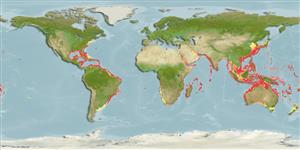Common names from other countries
Environment: milieu / climate zone / depth range / distribution range
экология
морской демерсальный; пределы глубины 30 - 270 m (Ref. 11230). Tropical
Widespread in the Indo-West Pacific: and Atlantic.
Size / Вес / Возраст
Maturity: Lm ? range ? - ? cm
Max length : 60.0 cm TL самец/пол неопределен; (Ref. 124490)
позвонки: 119 - 130. This species is distinguished by the following characters: presence of pectoral fin; dorsal-fin origin is slightly anterior to pectoral-fin base, predorsal length 10.7-13.1% TL; anus anterior, below tip of pectoral fin, preanal length 15.9-18.9% TL; very short trunk, 2.8-5.5% TL; intermaxillary teeth 2; compound teeth on vomer 4; single row of 9-11 large compound teeth on lower jaw; head pores: IO 4, SO 3; M 6; POP 0; AD 1, F 0, ST 0; lateral-line pores: predorsal 3-6, prepectoral 6-9, preanal 8-12, total 57-75, the last at posterior two-thirds of total length; MVF 8-14-124, total vertebrae 119-128 (up to 130 in Robins & Robins, 1989) (Ref. 106136).
Inhabits coastal waters. Prefers muddy bottoms, often off mouths of large rivers.
Life cycle and mating behavior
Maturities | размножение | Spawnings | Egg(s) | Fecundities | личинки
Castle, P.H.J., 1986. Synaphobranchidae. p. 188-190. In M.M. Smith and P.C. Heemstra (eds.) Smiths' sea fishes. Springer-Verlag, Berlin. (Ref. 3973)
Статус Красного Списка МСОП (Ref. 130435)
CITES (Ref. 128078)
Not Evaluated
Угроза для людей
Harmless
Использование человеком
рыболовство: интереса не представляет
дополнительная информация
инструменты
Специальные отчеты
Скачать в формате XML
ресурсы в Интернет
Estimates based on models
Preferred temperature (Ref.
115969): 17.2 - 27.6, mean 23.6 (based on 944 cells).
Phylogenetic diversity index (Ref.
82804): PD
50 = 0.5001 [Uniqueness, from 0.5 = low to 2.0 = high].
Bayesian length-weight: a=0.00102 (0.00046 - 0.00225), b=3.06 (2.88 - 3.24), in cm Total Length, based on all LWR estimates for this body shape (Ref.
93245).
Trophic level (Ref.
69278): 4.0 ±0.4 se; based on size and trophs of closest relatives
Fishing Vulnerability (Ref.
59153): Moderate vulnerability (44 of 100).
